|
|
|
Sort Order |
|
|
|
Items / Page
|
|
|
|
|
|
|
| Srl | Item |
| 1 |
ID:
153367


|
|
|
|
|
| Summary/Abstract |
Sometime late last year, ground-launched cruise-missile batteries left Russia’s Kapustin Yar test range, possibly on flatbed rail trucks.1 Amongst these, United States officials contend, was a system that drives a coach and horses through the 1987 Intermediate-Range Nuclear Forces (INF) Treaty. Washington asserts that the cruise missile deployed at the end of 2016 has a range significantly above the INF Treaty threshold. Russia has so far dismissed the US claims.
|
|
|
|
|
|
|
|
|
|
|
|
|
|
|
|
| 2 |
ID:
153377
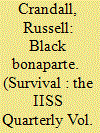

|
|
|
|
|
| Summary/Abstract |
The revolt of African slaves that erupted in Saint-Domingue in late August 1791 occurred in France’s most lucrative New World colony. Encompassing the western third of Hispaniola Island since 1659 and representing the most ‘profitable stretch of real estate on the planet’ according to historian Edward Baptist, the colony’s sugar, coffee, indigo and cotton served as the fuel for France’s ‘imperial engine’.1 Now, its sugar plantations were ablaze as slaves torched cane fields and killed their masters. With France’s own revolution having begun in 1789, free people of colour in Saint-Domingue also took up arms after French landowners refused to extend citizenship to them as laid out in the Declaration of the Rights of Man and of the Citizen. An independent Republic of Haiti was eventually established on 1 January 1804; by then, upwards of 350,000 Haitians and 50,000 French troops had been killed (the troops mostly from yellow fever), and the island nation’s economy lay in tatters.2
|
|
|
|
|
|
|
|
|
|
|
|
|
|
|
|
| 3 |
ID:
153373
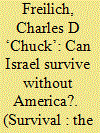

|
|
|
|
|
| Summary/Abstract |
The importance of the United States to Israel’s national security cannot be overstated. Washington is usually the first, and often the sole, port of call for strategic consultation – almost always the foremost one, and inevitably the primary means of addressing the challenges Israel faces. America is the be-all and end-all of most policy deliberations in Israeli national-security decision-making forums. Some four decades into this ‘special relationship’, the price of a truly remarkable partnership has been a significant loss of Israeli independence. Indeed, Israel’s dependence on the US has become so deep that it is questionable whether the country could even survive today without it.
|
|
|
|
|
|
|
|
|
|
|
|
|
|
|
|
| 4 |
ID:
153370
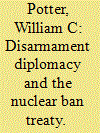

|
|
|
|
|
| Summary/Abstract |
The inclusion of a little-noticed phrase in the final document agreed by a review conference of the Nuclear Non-Proliferation Treaty (NPT) in 2010 can be seen, in retrospect, to have laid the foundation for what, some seven years later, has become a surprisingly successful effort to achieve a legally binding prohibition on nuclear weapons – or, as it is commonly known, a nuclear ban treaty. At the time of writing, a ban treaty was being negotiated at the United Nations, and was likely to be concluded in early July 2017. The ban treaty is, at least in some respects, an outgrowth of what can be termed the ‘humanitarian-impact movement’ (HIM). This movement, pursued by both states and civil-society groups, has sought to refocus attention on the humanitarian consequences of nuclear weapons, and especially the potential impacts of their use.
|
|
|
|
|
|
|
|
|
|
|
|
|
|
|
|
| 5 |
ID:
153374


|
|
|
|
|
| Summary/Abstract |
Israel’s space programme includes the capability to build, operate and launch satellites into space. In 1988, only seven years after the programme was established, Israel launched its first satellite, Ofeq-1.1 At that time, only seven countries had demonstrated an indigenous capability to develop and launch satellites. Given the high costs and risks involved in undertaking such an ambitious national project, it might appear surprising that a small country like Israel – even taking into consideration its acute security needs – would take on such a burden. The Israeli leadership’s strategic rationale for doing so is not obvious, inviting further consideration of the country’s national-security decision-making and goals.
|
|
|
|
|
|
|
|
|
|
|
|
|
|
|
|
| 6 |
ID:
153366
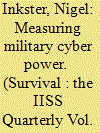

|
|
|
|
|
| Summary/Abstract |
Anyone who has been on a management training course will have been confronted with the proposition that ‘if you can’t measure it, you can’t manage it’. This statement, or some variant thereof, has variously and erroneously been attributed to different management gurus: specifically, W. Edwards Deming, who actually said the exact opposite, namely ‘It is wrong to suppose that if you can’t measure it, you can’t manage it – a costly myth’;1 and Peter Drucker, who doesn’t actually seem to have said it at all. Neither of these pioneering thinkers would be impressed with the mechanistic way in which incompetent managers – and there are many – attempt to enumerate things in ways that are misleading and counterproductive. Such managers, at best, reduce management to a meaningless box-ticking exercise and, at worst, set themselves up for unpleasant surprises when they discover that what purports to be solid, fact-based analysis turns out to be highly misleading: as Mark Twain put it, ‘what you know for sure but just ain’t so’.
|
|
|
|
|
|
|
|
|
|
|
|
|
|
|
|
| 7 |
ID:
153376


|
|
|
|
|
| Summary/Abstract |
Following its 2015 parliamentary and presidential elections, Poland has reversed its consistently pro-European foreign policy, marking a radical departure from its post-1989 course. Whether this turn is the result of some well-developed strategy, or merely a natural extension of illiberal domestic reforms introduced by the new government, is irrelevant.1 What matters is the outcome. Poland is no longer an engine of European integration, nor does it seem to value its relationships with Germany and France. Instead, the new government has pledged to revive an interwar alliance of central and eastern European (CEE) states, which Poland, as the largest country of that region, would naturally lead. To justify this revolution, it has deployed the familiar claim that Poland must protect its sovereignty and national interest against Brussels and Berlin. In particular, Poland must defend itself against the European Union’s (EU) unchristian, liberal values; against German economic domination; and against being forced to accept migrants and refugees professing non-Christian faiths.
|
|
|
|
|
|
|
|
|
|
|
|
|
|
|
|
| 8 |
ID:
153365


|
|
|
|
|
| Summary/Abstract |
The 2003 Iraq War was one of the great disasters in the history of American foreign policy. This conclusion is by now, and for good reason, very widely accepted. In the years since the war, however, other, less useful conventional wisdoms have formed. Among these, none is more salient – or more misleading – than the notion that the war was a product of liberalism. This view has been promoted and endlessly repeated by prominent academic realists such as John Mearsheimer, Stephen Walt, Barry Posen, Christopher Layne and Michael Desch. These academic realists were early and vocal critics of the war, which they indict as the product of essentially liberal American foreign-policy impulses, manifest in both liberal-internationalist and neoconservative circles.
|
|
|
|
|
|
|
|
|
|
|
|
|
|
|
|
| 9 |
ID:
153369


|
|
|
|
|
| Summary/Abstract |
As an organising concept, strategic stability played a central role in the strategic policy of the Obama administration, as set out in its policy and posture reviews of 2009 and 2010. The administration used strategic stability as a guide to policy development in a changed security environment, and valued it particularly in advancing cooperation with Russia and China at what seemed a hopeful moment in relations with both countries. Eight years later, it is time to take stock of the results of that approach, and to look for lessons. As the Trump administration conducts its own reviews, it must assess whether and how strategic stability might fit with its own guiding principles, such as ‘America First’ and ‘peace through strength’.
|
|
|
|
|
|
|
|
|
|
|
|
|
|
|
|
| 10 |
ID:
153371
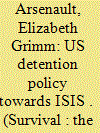

|
|
|
|
|
| Summary/Abstract |
The United States’ resort to torture in responding to past terrorist threats raises questions about how the country will deal with captured members of the Islamic State (also known as ISIS or ISIL). As a US-led coalition seeks to retake the ISIS stronghold in northern Iraq – and after that Raqqa, the group’s Syrian headquarters – the United States has opted to delegate responsibility for detainee handling to Iraqi and Kurdish forces. US involvement against ISIS thus far has comprised an air campaign supported by special-forces troops on the ground, limiting the possibility for detainee capture. Nevertheless, the policy of delegating responsibility for any prisoners generates two key questions: what steps should the United States take to ensure the humane treatment of detainees at the hands of its allied partners, and how will the United States craft a detention policy if the fight extends beyond the current air campaign?
|
|
|
|
|
|
|
|
|
|
|
|
|
|
|
|
|
|
|
|
|